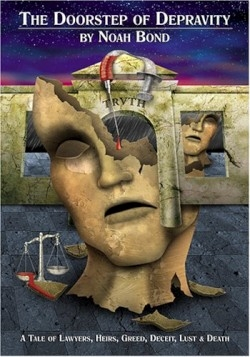The Doorstep of Depravity
Aptly named Noah Bond’s second novel The Doorstep of Depravity is the treacherous tale of a young doctoral student who inherits millions from her late Uncle Rupert a man she barely knew. Although this premise seems simple enough the story includes much more than an innocent heiress from Ohio State. Instead among a handful of unique only mildly developed characters the novel offers lies deception and misplaced trust.
Early in the book readers learn not surprisingly that the multimillion dollar estate has a catch. The heiress Koln Claussen who prefers to be known as Kay is required to marry within 60 days of her uncle’s death to prove that she intends to procreate. If she fails to do so her inheritance reverts to her money-hungry cousins. Unfazed by this harsh requirement Kay promptly marries a former colleague and one-night stand the charming and very Irish Denny. For the record attorneys Grace O’Higgins and Robert Brandt gynecologist Dr. Pantu court reporter Luisa and cousins Gunnar and Elke watch in stunned amazement as Kay marries Denny in a clinical ceremony.
As these events unfold at a nightmarish pace several of the story’s characters die unexpectedly. Creating suspense and a desire for answers Bond draws in both the surviving characters and readers who want to know why people are dying and who will be next. To find out the truth O’Higgins and Brandt follow a rapidly fading trail left behind by Kay who may not be what or whom she appears to be.
Throughout the novel Bond creates a sufficient level of interest to keep readers continuously engaged. Using just the right number of characters the action is fast-paced and colorful. Readers will enjoy the author’s word choice and flow as well as his creativity. His style is easy to read and follow.
However the book contains very little author narrative. Instead the majority of the story is told through the eyes of the characters in conversations with one another giving it the feel of a screenplay rather than a novel. While the constant conversations work for many of the passages the witty repartee wears out its welcome as Bond liberally tosses in irrelevant details and tasteless jokes.
“Since the sun shines most of the time in California the sugar percentage would always be vintage by French standards.” She sipped again. “But fortunately for the French the pinot noir grape doesn’t require that much sunlight.” (Kay)
“I’ll drink to that.” (Elke)
“God wants us to be happy. Wine is the proof. Ben Franklin said that.” (Kay)
“And I thought he spent all his time writing the Declaration of Independence.” (Elke)
In addition to such distracting unnecessary conversations as the one quoted above between Kay and Elke the lack of editing occasionally interferes with the flow of the story. Bond also tosses in some self-promotion which might leave a bad taste in some readers’ mouths. Such tactics diminish the quality of what could have been a decent rainy day novel.
Disclosure: This article is not an endorsement, but a review. The publisher of this book provided free copies of the book and paid a small fee to have their book reviewed by a professional reviewer. Foreword Reviews and Clarion Reviews make no guarantee that the publisher will receive a positive review. Foreword Magazine, Inc. is disclosing this in accordance with the Federal Trade Commission’s 16 CFR, Part 255.

